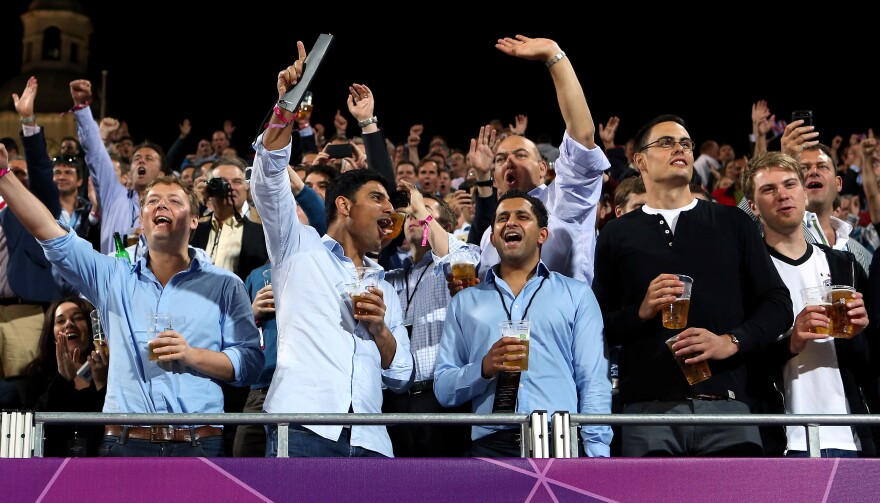There seems to be a vague logic that dictates which Olympic sports are conducted against a backdrop of noise, and which operate in a cone of silence.
For the most part, the more a sport depends on a fine motor skill, the quieter the spectators are meant to be. Shooters squeeze triggers before mostly hushed crowds. But in many shooting disciplines, the competitors line up in a group and can shoot at any point during their time allotment. So not only is gunfire ringing in their ears, crowds often become noisy, depending on the results.
In archery, crowds are mum as the archers draw their bows, but erupt in cheers when the arrows hit home. In badminton and tennis, they're quiet for serves; but in volleyball, serves are the occasion for catcalls, jeers — and, as far as I can tell, in a brutally contested Bulgaria vs. Poland match, loudly shouted suggestions of inappropriate relations with creatures of the animal kingdom.
In track, the throwing events are conducted relatively unnoticed on the infield, as the crowds go wild for the runners circling them. When runners are in their starting blocks, the crowds are hushed, and during the very big races, the field athletes will pause their competition.
Right before Usain Bolt and the field of the men's 100m sprint were set to start, the men's hammer throw was still being contested. The burly ballisticans were made to pause for their fleeter colleagues. In other words, Olympic organizers decided to STOP Hammer Time.
A counterintuitive example of crowds that aren't quiet is for the all-around events in gymnastics, when two apparatuses are in use at once. There you have the sight and sound of an inverted gymnast, taking his life in his hands as he propels around the horizontal bar, having to tune out an audience turned suddenly clamorous for a nailed Tsukahara double pike over on the vault.
During the men's team event, I saw Jonathan Horton of the U.S. stick a landing off the bar, and the crowd immediately went crazy. Horton did the 360-degree two-handed wave thing and seemed genuinely thrilled. He had not noticed that at the precise moment of his dismount, a member of Team Great Britain had completed a floor routine that ensured the home team would medal for the first time in 100 years. If you know Horton, please don't let him read this — I'd hate to rob him of his moment.
The oddest interplay of sport and shushing that I've encountered in these games is in weightlifting.
Maybe I'm used to my home gym pumping out the hits of the '70s, '80s, '90s and today (pity the unbranded decade from 2000-2010) — but I have never associated weightlifting with silence. Would that it were. I could use a little less of the two guys in Zubaz pants screaming at each other, "YOU CAN DO IT! ONE MORE! I GOT YA!"
But here at the Olympics, the crowd grants the lifters quiet — except during the heavyweight finals, when the Iranians could not be shushed. They flouted the norms of shushable society. They refused official shush inspectors at the border.
The Iranians claimed they had been refining noise in underground bunkers for clearly peaceful purposes. They were among the Axis of Uproar. But their tactics paid off. Iranian Behdad Salimikordasiabi won the competition; Sajjad Anoushiravani, also from Iran, placed second — and the crowd roared its approval.
Copyright 2020 NPR. To see more, visit https://www.npr.org. 9(MDA4MjgzNjQ1MDEzMTc5MzUzNzIxNjNmZg004))




